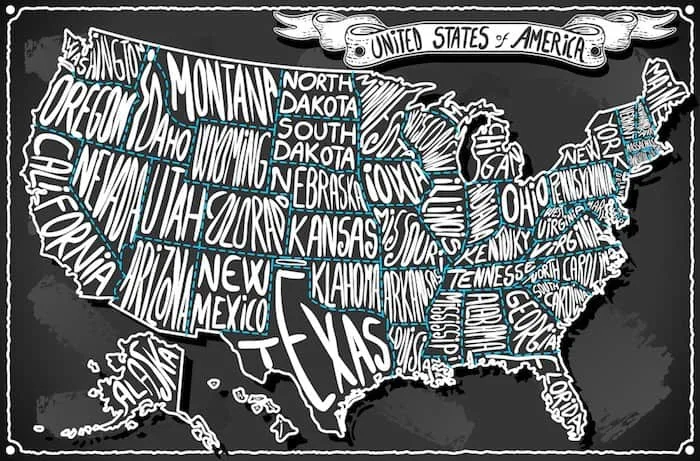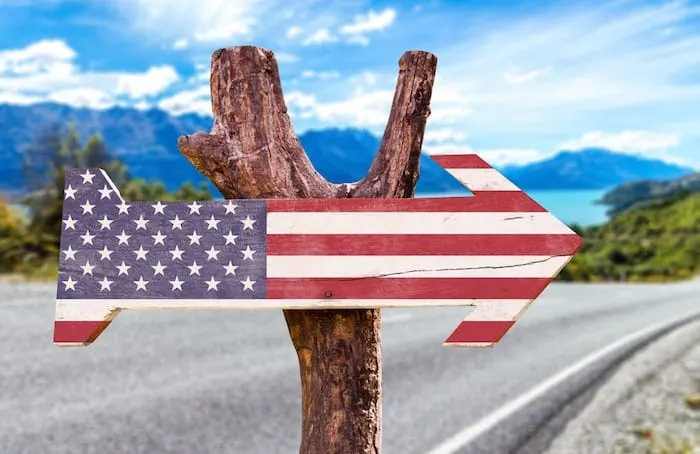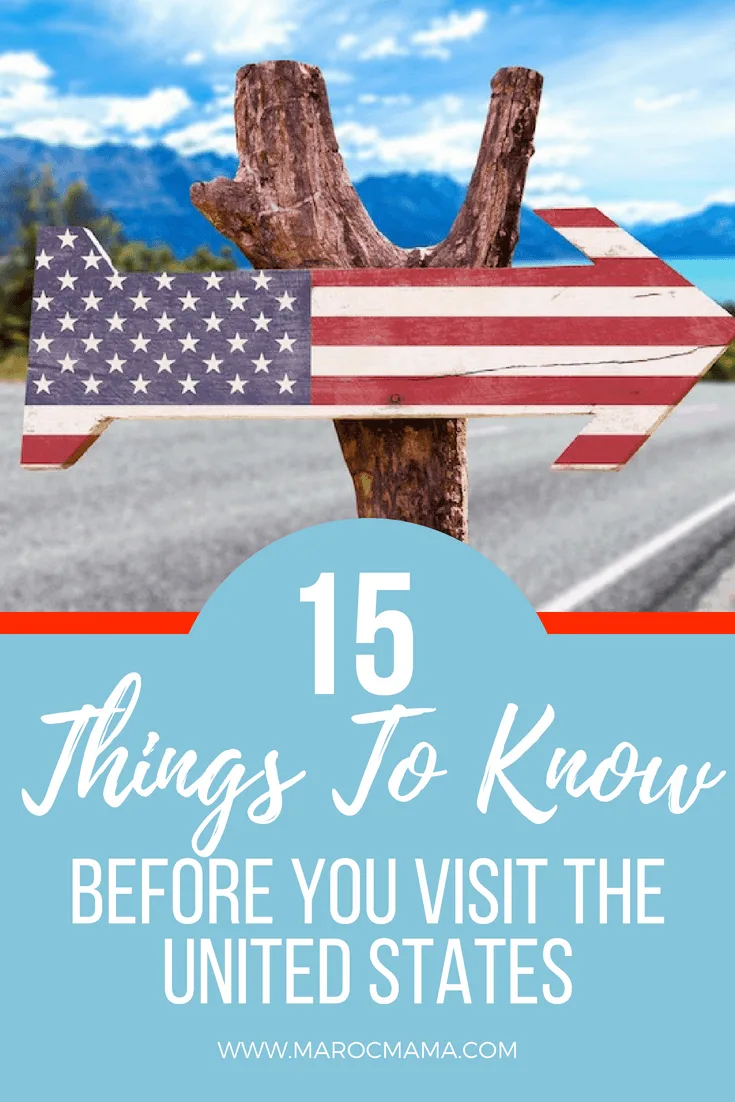I feel like the longer you’re away from the place where you were raised, the more obvious things become. This summer on a road trip in the US I began to think about all the “American-isms” that would seem different or that I would want visitors from other countries to be know about before they arrived. Some things are good, while others less so. In no particular order or grouping these are the most obvious things that stick out.
Are you visiting the US? Here’s some things you should know;
1. Yes, there are guns. In some cases lots of guns. Most people who have never visited the US find this hard to believe. You shouldn’t be overly concerned. There are places, especially in large cities where gun crime is very real but 9 times out of 10 you’ll never encounter a regular citizen with a gun. There are many people who visit for the opportunity to hunt or fire guns at a gun range. You can do that here too.
2. Large-ness. The United States embodies the word big. The land is big. Cars are big. People are big. Food is big. Home are big. It’s just big! For a first-time visitor this can be overwhelming, in fact whenever I go back, I realize I’ve forgotten how big things are.
3. Healthcare. This fact is an important thing to know. Whatever you do, DO NOT get sick in the US. You will want to make sure you have very good insurance when you visit. Healthcare costs are extremely expensive and many people who live in the US go bankrupt due to medical debt. If you are visiting, don’t have healthcare, and fall sick think long and hard if your illness warrants a visit to the emergency room. (The Atlantic published an article that stated the average cost of an ER visit is $2,000+) If you would rather visit a doctor it will be almost impossible to find one that will see you without you having medical insurance. In the US medications are also tightly controlled. You will find it easy to get (really good) over the counter medications, however unlike in other parts of the world where you can walk in to a pharmacy, explain your symptoms and have the pharmacist give you medication, you’re on your own or need a prescription from the doctor in the US.
4. Waivers and Liability. Similar to point #3 there are a lot of legal battles in the US. For most activities in which you participate you may be asked to sign a liability waiver saying you will not hold the operator responsible if something happens to you. In the US following the law IS a big deal. Laws are enforced uniformly and have set fines and punishments. Don’t try to bribe police officials (ask MarocBaba about that one…)
5. 911 Emergency Services. If you have an emergency or need the police, pick up any phone and dial 911. A dispatcher will answer on the other end and send the help you need very quickly. This is one of the best services in the United States.
6. Grocery Stores. While the idea of a one-stop shop is more and more common around the world, it’s a staple in any US city. While in Europe you can still stop off in a butcher, cheese shop, bakery etc to pick up your goods this isn’t the case in the US. All food shopping, and often times shopping for other items is done in a grocery market. On that same token most Americans shop once a week or less and buy everything for the week at one time. Don’t forget the mega bulk stores like Costco and Sam’s that the US is famous for. Where else can you buy a small vat of mayo or 100 rolls of toilet paper at one time?!?
7. Public Transportation. In many cities there is some public transportation; buses, subways, trains etc. But in smaller cities there isn’t. The size of the country also means that resources are stretched. There’s a reason most Americans have at least one car, it’s because there is a very limited public transportation infrastructure. The best way to get around when visiting? Rent a car.
8. Tipping and Wages. In most of the world tipping is discretionary and only a small amount is left. In the US 15-20% on services is expected. Waitresses are typically paid under $3 an hour, yes that’s the minimum wage. The majority of their salary comes from tips. When ordering take this into consideration and add the tip on the top of your purchase price. But be careful and check your receipt, in some places the tip is added and you can adjust up or down.
9. Playgrounds. American cities large and small have (free) playgrounds for children. There are play structures, pavillions, and open spaces for sports. This green space is something I really learned to appreciate when we moved to Morocco where playgrounds don’t really exist.
10. National and State Parks. I’m not over the top patriotic but this is one thing I’ll say the US does better than anyone else. We have done a great job preserving large natural spaces. Not only are they amazing examples of the natural world, they are open to the public for a very small admission fee. Millions of acres of land, monuments, and historical sites are protected from development and poaching. If you’re visiting you must see at least one. Pipestone National Monument was one of my recent favorites.
11. Public Libraries. Along with #9 this is something I really miss. Nearly every city has a free, public library. You’re welcome to go and read all day, use the internet, or attend workshops and classes that are being held. For children there are lots of programs like story hours, toys to play with, and crafts. If you plan to spend sometime in an area check out their local library and see what is on offer. You don’t need to be a resident to attend!
12. Discounts. The deal reigns supreme in the US. Outlet malls, a collection of shops that sell clothing and merchandise that was not popular in stores or is from the previous season, are a great spot to score a really good deal. Many times there’s even clearance sections in the stores for a deeper discount. You can find coupons and discounts for local attractions at the local tourism office or in newspapers. Ever heard of a garage sale or thrift sale? Weekends, especially in summer will see people opening up their driveway or garage to sell off old items they no longer want.
13. Plastic over Paper. Credit cards and bank cards are the preferred mode of payment in most places. There are even some places that won’t accept cash payments. You’ll need a credit card to check into a hotel, and when you rent a car. But, you’ll also want to be careful when using your card to withdraw cash. Many ATM’s charge a fee to use them, on top of the rate your bank charges or the foreign conversion fees. Look for No Fee ATM’s often in gas stations.
14. Rest Stops. If you decide to drive around the country you’ll need to pull over. There are long stretches of highway where you won’t see much of anything. A rest area and a gas station are two different things. While some rest areas have gas stations not all do. These are points where you can pull off, find a bathroom, possibly a vending machine and a place to take a walk.
15. English. No matter where I’ve gone I’ve found someone that speaks at least some English to help me. If you don’t speak English (you’re probably not reading this post!) you will have a hard time in the United States. Most Americans do not speak any other language. Unless you are in a major city like New York or Los Angeles don’t expect people to know anything in the language you speak.
Finally, most Americans are really nice. In fact many visitors think we’re too nice. What can I say? We’re a friendly bunch of people. We smile a lot. We like to make small talk about any and everything. Many visitors are surprised that Americans know very little about the rest of the world. We might not know much about the place you’re from but don’t be angry, just share with us! You’re the cultural ambassador of your country when you visit, help us learn!



estaservice.us
Saturday 22nd of February 2020
It is so important to understand the culture of any particular country before paying a visit. It can can make the travel easy going and when one is aware of of everything that is expected then there's less trouble in planning the trip. US is such a beautiful country and there's a lot to explore. The list that you have shared is really informative and helpful. Thanks for sharing it with us!
Minghao Miao
Monday 12th of August 2019
Amanda, thank you for your wonderful tips for the visitors to America. I come from China and I am going to US as an exchange student in a few days. Looking forward to exploring America!
Linda Bibb
Sunday 23rd of September 2018
Good insights, Amanda. I'm especially glad you mentioned the minimum wage for servers. You're right that many visitors to the US don't realize how important tips are to workers. I'd like to add that to NOT leave a tip is tantamount to saying "you provided poor service."
Kel
Tuesday 21st of January 2020
In Oregon, the minimum wage for servers is the same for any job yet many people still tip (yet the often still make more than minimum wage hourly). These servers often make more money than well educated people in much more difficult jobs. Tipping should not be expected but received when they provide good service beyond your expectations. So if you don't want to over tip, check out the states wage structure.
Eli
Sunday 8th of October 2017
Everything here seems pretty spot on, although I think it's somewhat misleading to suggest that the minimum wage is only $3. Generally, the minimum wage across the country is between 7-8 dollars, with each state setting its own wage around those numbers. But jobs that earn tips aren't required to abide by the minimum wage, which is why servers and delivery drivers often get paid much less that that.
I don't mean to suggest that you were ignorant to this, I'm just saying your phrasing might lead a foreigner to infer that American employees are treated more cruelly than they actually are.
Amanda Mouttaki
Sunday 8th of October 2017
In this article I was only referring to servers and delivery drivers. There is a minimum wage set for those positions (I worked in one for a long time) and it is under $3 an hour but can vary by the state. I did so to explain tipping culture and why waitstaff rely on tips. Even with a minimum wage at $7-8 for other jobs it remains a cruel wage as it's not a livable wage in just about any place in the US.
Celeste F
Tuesday 5th of April 2016
Hi Amanda!
I am finding your posts about Morocco uber helpful and I think your blog is a great service!
So: in this post, I was confused about whether you meant 1 out of 10 people here own a gun or 1 out of 10 people are carrying a concealed weapon.
Could you please clear this up for readers? Even the suggestion that a foreigner not worry too much about guns because 9 out of 10 people won't have one is alarming.
I am 45 years old and have never seen a gun except for a side arm on police or other security personnel. I live in New England but have traveled to most of the other 49 states.
Nobody I know has a handgun gun for protection or a rifle for hunting or any other gun for any other reason excepting five friends who are required and trained to have one for work.
As to not worrying about concealed weapons that you can't see? I take this to mean perhaps there may be a gun kept under the counter in some convenience or liquor stores You visit, but don't worry about it unless you intend to rob thep place.
I worked in social services, next to a housing project where there certainly were guns because there were gang shootings. I was fearless about being there because I was not in a gang, for example.
Lastly, I hope you could speak to the statewide geography of gun ownership, the type of weapon owned and/or gun violence against tourists. For example: if I am in Florida, Nevada or Texas, my radar about who may be carrying goes up a lot.
In most states it is completely off the radar. Most guns are kept in the home for hunting or protection. Unfortunately, that is where most gun violence and accidents take place.
I write this because I have been appalled by misinformed tourists thinking there are so many guns in Manhatran or LA, that they are likely to see one, or witness a "drive by".
For this reason, I hope that you could be somewhat more explicit on the subject. You are a sane, educated and reasonable woman, so I know that people will look to you for reliable information, as I do.
Much appreciation for you and you fantastic blog,
Celeste
Jerry
Sunday 5th of November 2017
Hi Celeste:
I too was confused about American traditions and lifestyles, but that changed quickly after I married an American I met while on holiday to the US!!!
There's far too much hoopla and worry about guns in the US. I've been here since 2002 and have never seen a gun except on a police officer and even those are small and not easily seen. Don't worry about people carrying guns unless you plan on committing armed robbery, engaging in dangerous drug deals, or committing a murder.
You also need to understand why most Americans aren't familiar with the rest of the world. The United States is huge. The news networks, and there are dozens of them, focus almost exclusively on US news and events. There are always lots of both good and bad things happening across FIFTY states! Americans typically don't get much info from other countries, except for Britain or Canada. You should know that the big city newspapers, such as the Los Angeles Times (where I live), even has different editions for suburban areas and the city proper. I've never seen that anywhere else in the world.
Don't be so concerned about tipping protocol as you simply leave a tip at a restaurant when you have received good service. Also, wait staff pay has changed drastically across the country and several locales now pay servers between $8 - $15 per hour. You should also understand that many server jobs are sought after because of the earnings received from tips. This has simply been an American tradition (as I've had it explained to me).
American friendliness IS GENUINE and SINCERE as Americans generally love to meet people from 'overseas'. They particularly like Brits, Aussies, Germans, French and Italians. They are somewhat uneasy with middle Easterners, Indians and Russians. There have been stories in the news about rude And pushy Russians and 'dirty' Indians or 'middle Easterners'. Aussies and Brits have reputations of being heavy partiers.
Just be friendly and use good judgement as Americans love to interact with you and you may very well be treated as a VIP!
A couple of final tips:
Americans tend to be considerably more religious than Aussies or Europeans and there are thousands of large mega churches throughout the country, especially in the South and Midwest.
Remember there are considerable differences in customs and food in the various regions of the country. You will notice this particularly outside the big cities. Get out and try the local restaurants and cuisine and you'll be amazed at the food quality and variety.
One last note: if you become ill, look for an 'urgent care facility' . You can get medicine and other non emergency services at reasonable prices. Just ask the locals for an 'urgent care' facility and you'll be fine.
Amanda Mouttaki
Thursday 7th of April 2016
Thank you for your long insightful comment. The reality however I have learned from living overseas is that indeed America is plagued by a gun epidemic. The number one reason people from overseas cite for not visiting is the threat of gun violence. I have been in almost 30 countries and nowhere is gun violence as common and as much a threat as in the US. While the chances may be small they are everywhere. Whether for protection, hunting or whatever other reasons people may give, they are a big problem and something that visitors should not only be aware of but alerted to.